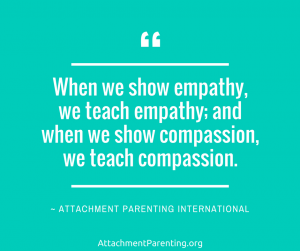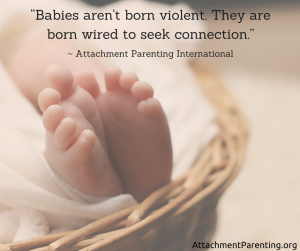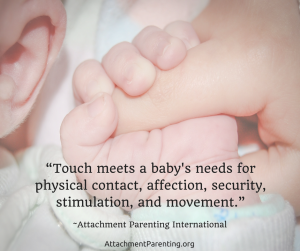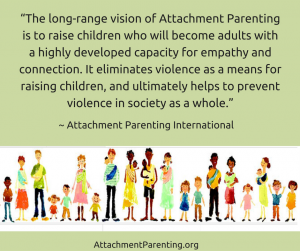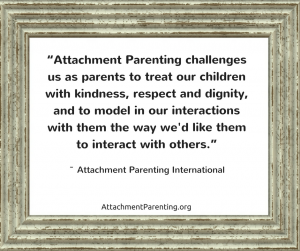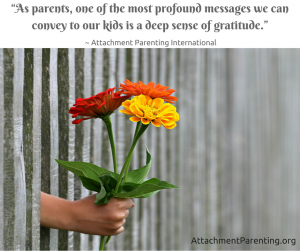Category: Engage in Nighttime Parenting
Babies are born to connect
Touch
The long-range vision of Attachment Parenting
The AP challenge: Parent with kindness, respect & dignity
A deep sense of gratitude
Sharing gratitude on a nightly basis
 Before my children go to sleep at night, I have 3 questions that I ask them:
Before my children go to sleep at night, I have 3 questions that I ask them:
- What did you learn today?
- What was your favorite part of the day?
- What are you grateful for?
These questions have become a ritual for us as we have been doing it for years. We continue to do so even as we navigate the middle school days for my youngest and now are moving into the high school years for my oldest. I know we all look forward to this time of connection as it opens up a conversation that goes beyond the simple responses to those questions.
I have been surprised to find that the topic about gratitude is often the one that is discussed the most. There is an appreciation for all of us when we take the time to offer our thanks for something that happened during the day. My girls’ answers may be about a material item they received or a favorite food that they were able to eat — especially if it is a dessert — and I have found that is a practice for me to listen to their responses without judgement.
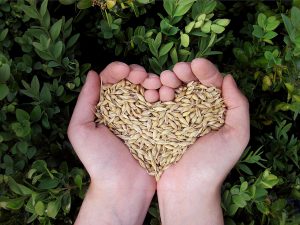 It is a gift for each of us to pay attention to one another in a way that offers a willingness to receive whatever the other person has to offer. I am thankful for this opportunity to connect with my kids and for us to grow in our understanding that often it is the simple things in life that we are most grateful for.
It is a gift for each of us to pay attention to one another in a way that offers a willingness to receive whatever the other person has to offer. I am thankful for this opportunity to connect with my kids and for us to grow in our understanding that often it is the simple things in life that we are most grateful for.
Sometimes my girls give me the same answer for all 3 questions, and I am fine with this as I recognize that maybe being tired overcomes the desire to engage in conversation. I trust that they are offering what they can in the moment and that on a different day I may hear much more when they are ready to share. It is also possible that one event was the highlight of their day and the one thing that does answer all 3 of the questions. When I realize this, I am excited that they were able to engage in an activity that was filled with joy.
The time just before we fall asleep is one of my favorite moments of the day. I know that this can be a magical time when both girls are willing to open up with me and express what they are thinking or how they are feeling, which they might not do during any other time of the day. Every once and awhile, I have tried to get them to answer the questions over dinner only to be confronted with the comment that the day is not yet complete so I will just have to wait until later in the evening.
Over the years, I have grown to realize that this simple time with my kids is one of the best ways to engage in peaceful parenting as it reminds us what we are thankful for and encourages a dialogue that may not have taken place. I am amazed at all the events that they encounter in a day without me. I trust that they are navigating each experience with grace even when it is not so easy. I know that they will talk to me when needed.
As we move into a season where many families are expressing gratitude, I am reminded of how lovely it is for me and my kids to share our thanksgivings on a nightly basis.
Is human nature inherently good or bad? And does this predict what type of parent you will be?
I recently exchanged e-mails with one of my former students about the perennial question concerning human nature: Are humans good or bad?
This question continues to fascinate us. When I lecture about human nature to my students, I like to frame the debate by pitting Thomas Hobbes against Jean-Jacques Rousseau.
 Thomas Hobbes (1588-1679) was an English philosopher and the author of the book Leviathan. Famously, Hobbes declared that primitive human life was “solitary, poor, nasty, brutish, and short.”
Thomas Hobbes (1588-1679) was an English philosopher and the author of the book Leviathan. Famously, Hobbes declared that primitive human life was “solitary, poor, nasty, brutish, and short.”
I use Hobbes to illustrate a pessimistic view of natural man. That is, as illustrated by his famous summation, Hobbes felt that the natural state of man was bestial. According to Hobbes, therefore, it is civilization that steps in and rescues humanity from our primal depravity. In this view, human nature is a nasty thing that human culture rescues. In Hobbes’ view, being civilized is good and being a savage is bad.
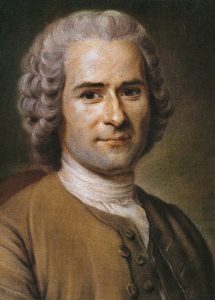 Contrast that with the view of Jean-Jacques Rousseau (1712–1778), the Enlightenment philosopher whose book The Social Contract influenced the French Revolution: “Man is born free, and everywhere he is in chains.”
Contrast that with the view of Jean-Jacques Rousseau (1712–1778), the Enlightenment philosopher whose book The Social Contract influenced the French Revolution: “Man is born free, and everywhere he is in chains.”
In contrast to Hobbes, Rousseau declared that humans in earlier times were “noble savages.” According to Rousseau, humans are naturally and innately good, and it is civilization that turns man into a “beast.” Consequently, Rousseau argued that modern man should seek to restore the conditions of our lost Eden and live a more natural, rather than technological, life.
To summarize, we can create a quick schematic contrast of Hobbes and Rousseau:
- Hobbes — Human Nature = Bad, Civilization = Good
- Rousseau — Human Nature = Good, Civilization = Bad
For Hobbes, civilization saves us from ourselves. Without it, we would regress to a beast-like state. For Rousseau, civilization is killing us. For Rousseau, the goal is to reclaim a more natural existence.
So, who is right?
Unfortunately, by this point in my lecture, only a about two students are awake. So, to show them that this question is actually of practical and not just academic interest, I like to ask the following question: Are you planning to breastfeed your baby?
This question gets the girls awake, for obvious reasons. It gets the boys awake because the word “breast” was used. Human nature, good or bad, can at times be remarkably predictable.
I bring up parenting in the conversation about Hobbes and Rousseau, because it is in parenting where we tend to reveal if we vote with Hobbes or Rousseau.
For example, Hobbesian parents tend to think that a child’s nature is unruly, undisciplined, and selfish — not in an evil sort of way, more of a benign “they don’t know any better.” Thus, these parents tend to emphasize training and structure.
Rousseauian parents tend to think that a child’s nature is innocence and goodness. These parents tend to de-emphasize structure in the child’s environment.
Here are some more possible locations of contrast:
- Painkillers during delivery — Hobbesian parents more likely to use painkillers; Rousseauian parents more likely not to use painkillers.
- Feeding — Hobbesian parents more likely to bottle-feed; Rousseauian parents more likely to breastfeed.
- Feeding Times — Hobbesian parents more likely to feed on a schedule; Rousseauian parents more likely to feed on demand.
- Discipline — Hobbesian parents more likely to spank; Rousseauian parents more likely not to spank.
- Sleeping — Hobbesian parents more likely to allow child to cry in crib until asleep; Rousseauian parents more likely to hold child until asleep.
Now, I’m not suggesting this as some kind of rigorous, diagnostic classification. I’m mostly trying to illustrate a point: Whether we like discussing human nature or not, we are all working with a theory of human nature and that theory of human nature has practical consequences. For example, when parenting, some of us go “natural.” Others are more “technological” — painkillers, formula, behavioral parenting strategies.
And parenting is hardly the only place where we see these differences. We see Hobbesian and Rousseauian contrasts in how we choose to eat, how we choose to use medicine, and how we feel about city life — to name a few things.
Hobbes and Rousseau are still with us. And we, in the choices we make, keep their debate alive.
*Reprinted with permission from Richard Beck, PhD. The original article is published on Experimental Theology.
**Philosophers’ photos from Wikimedia commons.

